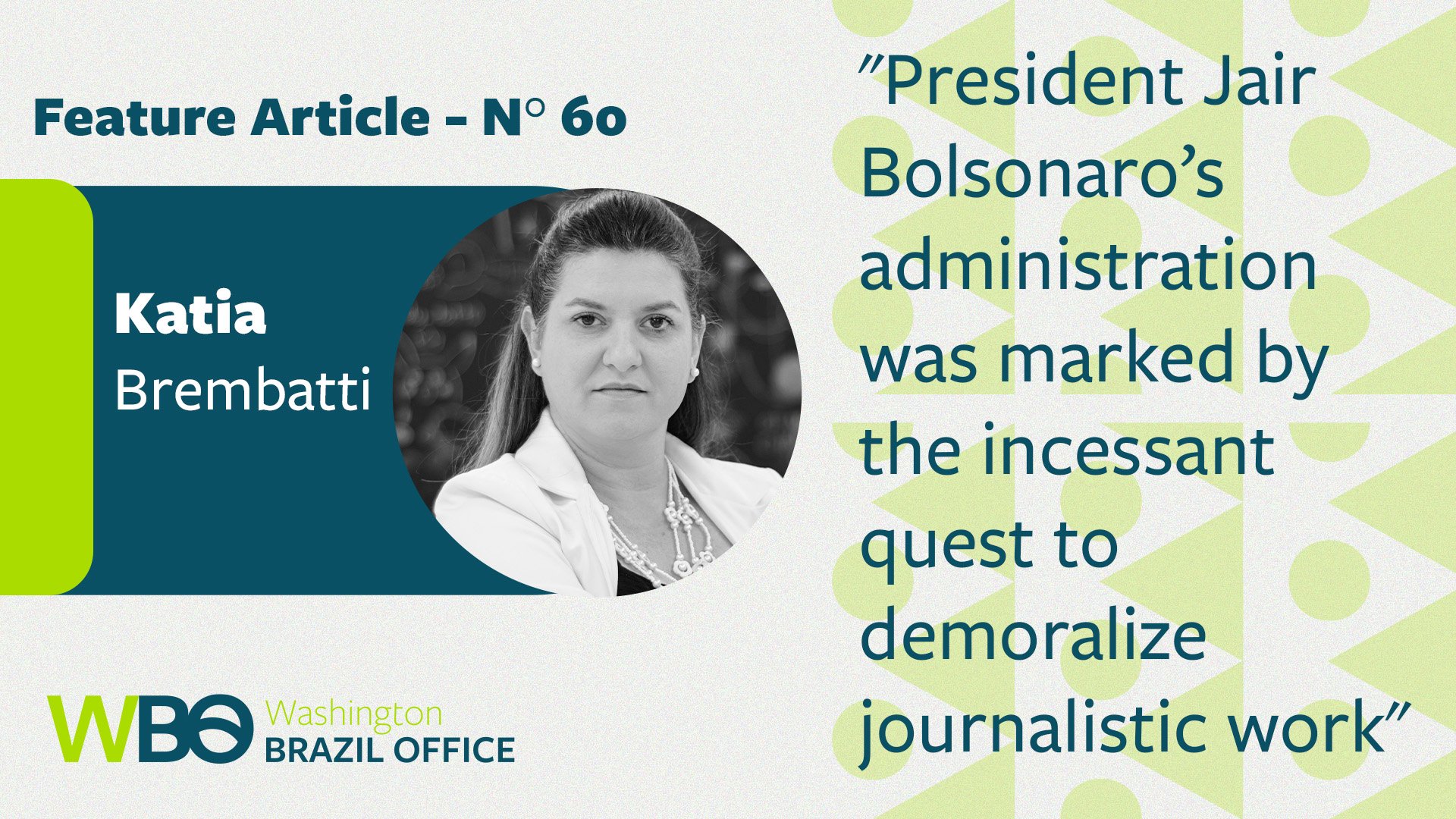Press and Power in Brazil: A Return to Normality?
Katia Brembatti is president of the Brazilian Association of Investigative Journalism (ABRAJI); editor at Estadão Verify, the fact-checking team within the newspaper O Estado de São Paulo, professor of journalism at the Universidade Positivo, and winner of journalism awards, such as Esso, Tim Lopes, Colpin/IPYS and Global Shining Light Award. This text was originally written for issue 60 of the WBO Newsletter, published on March 31, 2023. Fill in the form at the bottom of the text to access and subscribe to the WBO weekly newsletter in English.
More than a threat to freedom of the press, President Jair Bolsonaro’s administration (2019-2022) was marked by the incessant quest to demoralize journalistic work. It was an action orchestrated by the senior leaders in the federal government, which reverberated strongly among allies, based on the production of misinformation and denial of facts with a discourse that encouraged attacking the messenger when the message displeased certain groups and interests. In addition to affecting the image of the profession and, in the end, harming the population, which was led to believe that what was being conveyed by the mainstream media was misleading, the result of this Machiavellian strategy was also translated into numbers: in those four years, the number of freedom-of-the-press violations more than quadrupled, going from 130 attacks to 557, according to monitoring carried out by the Brazilian Association of Investigative Journalism (ABRAJI).
Violence against journalists escalated in the election year, when the ABRAJI survey identified a 69.2 percent increase in cases of serious aggression in the first seven months of 2022. What followed in the post-election period was even worse. During the journalistic coverage of the roadblocks and campsites in front of army barracks, both promoted by Bolsonaro allies, almost 100 cases of violence were recorded, including physical aggression, arson at a radio station, and a shooting attack on the office of a news website in the Amazon. These numbers represent at least one attack on the press per day at the end of 2022, a year marked by the deaths in June of British journalist Dom Phillips and indigenist Bruno Pereira in the Javari Valley of the state of Amazonas.
When looking at gender violence, the situation is even more alarming. There were 145 explicit gender attacks and/or attacks on women journalists, according to monitoring by ABRAJI, with an increase of 13 percent compared to 2021. The most common form of aggression (51 percent) is stigmatizing speech by authorities and public figures in order to disqualify the work of journalists. Even with so many registered cases, there is clear underreporting, as many women are afraid of losing their jobs or of being victims of online violence and decide not to report aggressors.
“In the coup attempt of January 8 in Brasilia and in the following days, 45 cases of physical aggression, threats, confiscation of equipment, and impediment of journalists’ work were recorded”
Another form of intimidation of the Brazilian press has been judicial harassment. Politicians and people with great economic influence promote multiple lawsuits against the same journalist as in the case of the Hunters, Shooters and Collectors Clubs (CACs) against a television commentator, or when a public figure sues several people, including journalists, as in the case of businessman Luciano Hang. In this situation, it is not a question of the right to go to court for feeling harmed by a report, but of creating a system of pressure and intimidation.
For this reason, ABRAJI engages in strategic litigation, such as the lawsuits filed with the Supreme Court to prevent the blocking of access to journalists by profiles of public authorities on Twitter and against the indiscriminate use of Special Civil Courts that were created to facilitate access to the justice system for those who don't have the financial means to pay for a lawyer, but now are starting to be used in an attempt to silence journalists.
Even with the change of government in early 2023, the Brazilian press is still under attack. In the coup attempt of January 8 in Brasilia and in the following days, 45 cases of physical aggression, threats, confiscation of equipment, and impediment of journalists' work were recorded. Such violence led to the production of a dossier delivered to the new government by ABRAJI and other entities that defends freedom of the press. These organizations were pleased with the creation of the National Observatory on Violence against Journalists and Communicators, linked to the Ministry of Justice.
In the new Lula government, there has been an attempt, at least partially, to restore democratic relations and to seek a return to normality. But the resentment of those dissatisfied with the election result still remains strong and is reflected in acts of aggression, such as the one experienced by a reporting team from the newspaper O Estado de São Paulo in February 2023 during the coverage of landslides and floods. The country remains politically divided and lives in the shadow of what happened in the last four years.
In addition to good intentions, the new government needs to act to restore the foundations of a free press, namely access to information and transparency to the public. The recent imposition by the current administration of measures to ensure the secrecy of visits to the presidential palace shows the importance of guaranteeing the watchdog role over the powers that be by the press.
Some of the recommendations made by ABRAJI in its annual monitoring report about attacks on the press are directed at public authorities and include the strengthening of public policies to protect journalists, such as the Protection for Human Rights Defenders, Communicators and Environmentalists (PPDDH); the fight against impunity in crimes against journalists; theaccountability of public agents for attacks on journalists; and the advancement of legislative proposals that protect the work of press professionals, based on international standards for the protection of human rights. An expectation is that the winds really indicate changes.

